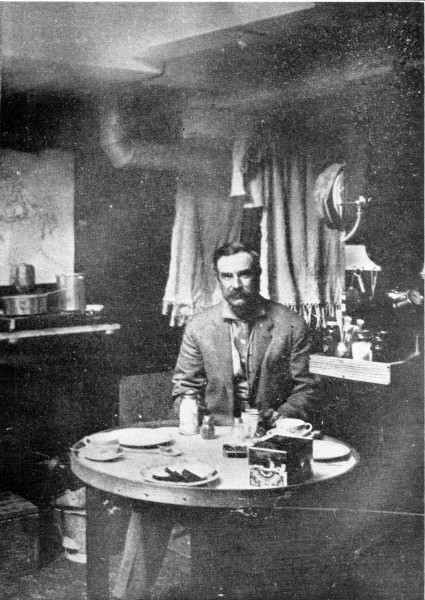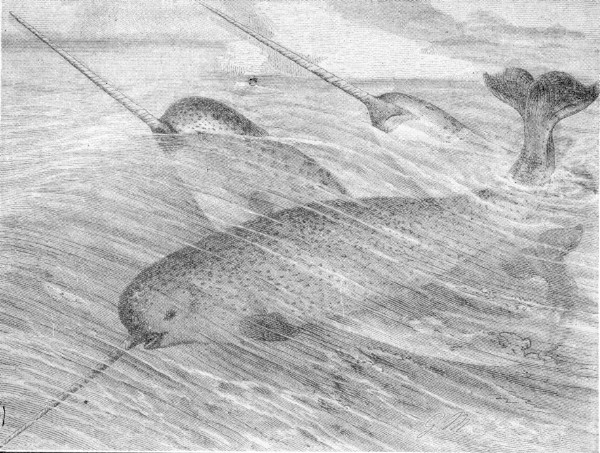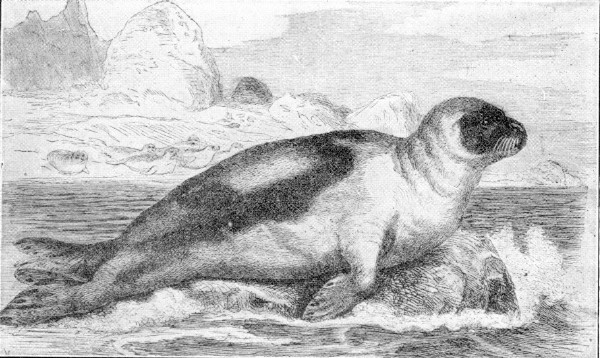| Web
and Book design,
Copyright, Kellscraft Studio 1999-2011 (Return to Web Text-ures) |
 (HOME)
|
| CHAPTER XVII.
KANE, THE MODEL OF PEARY. "An Arctic day and an Arctic night," says Dr. Kane in one part of his book, "age a man more rapidly and harshly than a year anywhere else in all this weary world." Dr. Kane was not yet forty years of age when he went to the north. When he returned he was a physical wreck, with barely strength to pen the volume that still lives in the libraries of explorers. The expedition under the command of Dr. Kane sailed from New York on the 30th day of May, 1853. It consisted of eighteen chosen men, besides the commander, embarked in a small brig of one hundred and forty-four tons burden, named the Advance. Dr. Kane's predetermined course was to enter the strait discovered the previous year by Captain Inglefield, at the top of Baffin's Bay, and to push as far northward through it as practicable. He was to cross Melville Bay in the wake of the vast icebergs with which the, sea is there strewn. These huge frozen masses are often driven one way by a deep current, while the floes are drifted in another by winds and surface-streams, disruptions being thus necessarily caused in the vast ice-fields. The doctor's tactics were to dodge about in the rear of these floating ice-mountains, holding upon them whenever adverse winds were troublesome, and pressing forward whenever an opportunity occurred. Dr. Kane's plan was based upon the probably extension of the landmasses of Greenland to the far north — a fact at that time not verified by travel, but sustained by the analogies of physical geography. With this plan in mind. Dr. Kane pushed the ship Advance to Melville Bay, where the first great difficulties were encountered. By arduous work, however, they reached Littleton Island, and deposited some stores. A long battle with ice and storm followed, lasting through the month of August, and the ship finally reached Cape George Russell, where the ship was prepared for a long imprisonment. Many interesting things were met with during the winter that followed. Temperature readings were made hourly, and the lowest found was in February, when seventy degrees Fahrenheit was reached. At this temperature chloroform froze and even chloric ether, never before known to freeze, became congealed. The ship was then in latitude 78. By March, 1854, the party showed heavy signs of their privation. Scurvy spots mottled their faces, and many could do no hard work. Dr. Kane himself, never a very strong man, was much exhausted. But he never relaxed in his determination to push north. He organized a party of men, placed himself at their head, and planned to force a way over bergs and mountains. First, however, he sent out an advance expedition with supplies — and this party came to grief, owing to a heavy gale, accompanied by a temperature of 57 degrees below. Three members of the party managed to force their way back, and on hearing their story Dr. Kane sought to go to the rescue. He started out with nine men. His own story of the trip contains this: "We had been nearly eighteen hours out without water or food, when a new hope cheered us. I think it was Hans, our Esquimaux hunter, who thought he saw a broad sledge-track. The drift had nearly effaced it, and we were some of us doubtful at first whether it was not one those accidental rifts which the gales make in the surface-snow. But, as we traced it on to the deep snow among the hummocks, we were led to footsteps; and, following these with religious care, we at last came in sight of a small American flag fluttering from a hummock, and lower down a little Masonic banner hanging from a tent-pole hardly above the drift. It was the camp of our disabled comrades; we reached it after an unbroken march of twenty-one hours. "The little tent was nearly covered. I was not among the first to come up; but when I reached the tent-curtain, the men were standing in silent file on each side of it. With more kindness and delicacy of feeling than is often supposed to belong to sailors, but which is almost characteristic, they intimated their wish that I should go in alone. As I crawled in, and, coming upon the darkness, heard before me the burst of welcome gladness that came from the four poor fellows stretched on their backs, and then for the first time the cheer outside, my weakness and my gratitude together almost overcame me. 'They had expected me; they were sure I would come!' " This is Dr. Kane's account of the retreat of the party, now consisting of fifteen men: "It was fortunate indeed that we were not inexperienced in sledging over the ice. A great part of our track lay among a succession of hummocks; some of them extending in long lines fifteen and twenty feet high, and so uniformly steep that we had to turn them by a considerable deviation from our direct course; others that we forced our way through, far above our heads in height, lying in parallel ridges with the space between too narrow for the sledge to be lowered into it safely, and yet not wide enough for the runners to cross without the aid of ropes to stay them. These spaces, too, were generally choked with light snow, hiding the openings between the ice-fragments. They were fearful traps to disengage a limb from; for every man knew that a fracture, or a sprain even, would cost him his life. Besides all this, the sledge was top-heavy with its load; the maimed men could not bear to be lashed down tight enough to secure them against falling off. Notwithstanding our caution in rejecting every superfluous burden, the weight, including bags and tent, was eleven hundred pounds.  JOHN R. BRADLEY IN THE CABIN OF THE "BRADLEY," IN NORTH GREENLAND, WHEN HE CARRIED DR. COOK NORTH.  THE ARCTIC NORWHALS.  GREENLAND SEAL CAPTURED BY PEARY. "And yet our march for the first six hours was very cheering. We made, by vigorous pulls and lifts, nearly a mile an hour, and reached the new floes before we were absolutely weary. Our sledge sustained the trial admirably. Ohlsen, restored by hope, walked steadily at the leading-belt of the sledgelines; and I began to feel certain of reaching our half-way station of the day before, where we had left our tent. But we were still nine miles from it, when, almost without premonition, we all became aware of an alarming failure of our energies. "I was of course familiar with the benumbed and almost lethargic sensation of extreme cold; and once, when exposed for some hours in the midwinter of Baffin's Bay, I had experienced symptoms which I compared to the diffused paralysis of the electro-galvanic shock. But I had treated the sleepy comfort of freezing as something like the embellishment of romance. I had evidence now to the contrary. "Bonsall and Morton, two of our stoutest men, came to me, begging permission to sleep; but Dr. Kane refused the permission, knowing that to sleep where they then were meant death. At last, however, they reached a point of temporary safety, and slept; and, says Dr. Kane, 'when I awoke, my long beard was a mass of ice, frozen fast to the buffalo-skin. Godfrey had to cut me out with his jack-knife.' " On proceeding, they came to a huge mass of ice-hummocks. Says the explorer: "It required desperate efforts to work our way over it — literally desperate, for our strength failed us anew, and we began to lose our self-control. We could not abstain any longer from eating snow; our mouths swelled, and some of us became speechless. Happily, the day was warmed by a clear sunshine, and the thermometer rose to - 4° in the shade; otherwise we must have frozen. "Our halts multiplied, and we fell half-sleeping on the snow. I could not prevent it. Strange to say, it refreshed us. I ventured upon the experiment myself, making Riley wake me at the end of three minutes; and I felt so much benefited by it that I timed the men in the same way. They sat on the runners of the sledge, fell asleep instantly, and were forced to wakefulness when their three minutes were out. "By eight in the evening we emerged from the floes. The sight of the Pinnacle Berg revived us. Brandy, an invaluable resource in emergency, had already been served out in table-spoonful doses. We now took a longer rest, and a last but stouter dram, and reached the brig at one p. m., we believe, without a halt. "I say we believe; and here, perhaps, is the most decided proof of our sufferings; we were quite delirious, and had ceased to entertain a sane apprehension of the circumstances about us. We moved on like men in a dream. Our foot-marks, seen afterwards, showed that we had steered a bee-line for the brig. It must have been by a sort of instinct, for it left no impress on the memory. Bonsall was sent staggering ahead, and reached the brig, God knows how, for he had fallen repeatedly at the track-lines; but he delivered, with punctilious accuracy, the messages I had sent by him to Dr. Hayes. I though myself the soundest of all; for I went through all the formula of sanity, and can recall the muttering delirium of my comrades when we got back into the cabin of our brig. Yet I have been told since of some speeches, and some orders, too, of mine, which I should have remembered for their absurdity, if my mind had retained its balance." Undaunted by such experiences as this Dr. Kane started in April on a sledge expedition to the north, seeking, he says, "for an outlet to the mysterious channels beyond (Greenland)." He was so weak by that time that he was at one time delirious for a week, and nearly died. Yet he achieved several remarkable discoveries. One was "Tennyson's Monument," a solitary column, or "minaret tower" of greenstone, the length of whose shaft was four hundred and eighty feet. It rose on a pedestal, itself two hundred and eighty feet high, as sharply finished as if it had been cast for the Place Vendome. But by far the most remarkable feature in the inland Greenland sea is the so-called "Great Glacier of Humboldt." Of this glacier Dr. Kane gives a description which constitutes one of the pieces of word-painting that fired Peary's imagination. "This line of cliff rose in solid glassy wall three hundred feet above the water level, with an unknown, unfathomable depth below it; and its curved face, sixty miles in length, from Cape Agassiz to Cape Forbes, vanished into unknown space at not more than a single day's railroad-travel from the pole. The interior with which it communicated, and from which it issued, was an unsurveyed mer de glace, an ice-ocean, to the eye of boundless dimensions. "It was in full sight — the mighty crystal bridge which connects the two continents of America and Greenland. I say continents, for Greenland, however insulated it may ultimately prove to be, is in mass strictly continental. Its least possible axis, measured from Cape Farewell to the line of this glacier, in the neighborhood of the eightieth parallel, gives a length of more than twelve hundred miles, — not materially less than that of Australia from its northern to its southern cape. "Imagine now the center of such a continent, occupied through nearly its whole extent by a deep unbroken sea of ice, that gathers perennial increase from the water-shed of vast snow-covered mountains, and al' the precipitations of the atmosphere upon its own surface. Imagine this moving onward like a great glacial river, seeking outlets at every fiord and valley, rolling icy cataracts into the Atlantic and Greenland seas; and, having at last reached the northern limit of the land that has borne it up, pouring out a mighty frozen torrent into unknown Arctic space." In the summer of 1854 Dr. Kane began his return to civilization. It was a journey full of peril, but never of despair, though by the end of the trip the men were starving, human wrecks. As they crossed Melville Bay death stared them in the face. They were going largely on foot, and making a mile a day. Dr. Kane's description of his rescue is typical of the thrilling descriptive passages in his book. He and his men were on the coast, awaiting they knew not what. "Just then," says the book, "a familiar sound came to us over the water. We had often listened to the screeching of the gulls, or the bark of the fox, and mistaken it for the 'Huk' of the Esquimaux; but this had about it an inflection not to be mistaken, for it died away in the familiar cadence of a 'haloo.' "'Listen Petersen! Oars — men? What is it?' and he listened quietly at first, and then trembling, said, in a half-whisper, 'Dannemarkers!' " It was a vessel from Uppernavik, one of the large Greenland ports, and in a few days the explorers reached this point from which their return to America was easy. A meeting with Dr. Kane after the latter's rescue, is described graphically by his brother. After telling of a terrible gale in Baffin's Bay, he said: "After this gale we had little or no more trouble with the ice; one or two trifling detentions of a few days brought us to the open water. We had drifted so far to the south that Lievely was nearer than Upernavik, and Captain Hartstein determined to put in there. We had a heavy gale the night after we left the ice; but so glad were we all to get clear of it, that I heard no complaints about rough weather. It cleared away beautifully towards morning, and we were all on the deck, admiring the clear water, and the fantastic shapes of the water-washed icebergs. All hands were in high spirits; the gale had blown in the right direction, and in a few hours we should be in Lievely. The rocks of its land-locked harbor were already in sight. We were discussing our news by anticipation, when the man in the crow's nest cried out, 'A brig in the harbor!' and the next minute, before we had time to congratulate each other on the chance of sending letters home, that she had hoisted American colors — a delicate compliment, we thought, on the part of our friends, the Danes. "I believe our captain was about to return it, when, to our surprise, she hoisted another flag, the veritable one which had gone out with the Advance, bearing the name of Mr. Henry Grinnell. At the same moment, two boats were seen rounding the point, and pulling towards us. Did they contain our lost friends? Yes; the sailors had settled that. 'Those are Yankees, sir; no Danes ever feathered their oars that way,' said an old whaler to me. "For those who had friends among the missing party, the few minutes that followed were of bitter anxiety; for the men in the boats were long-bearded and weather-beaten; they had strange, wild costumes; there was no possibility of recognition. Dr. Kane, standing upright in the stern of the first boat, with his spy-glass slung around his neck, was the first identified; then the big form of Mr. Brooks; in another moment all hands of them were on board of us. "It was curious to watch the effects of the excitement in different people, — the intense quietude of some, the boisterous delight of others; how one man would become intensely loquacious, another would do nothing but laugh, and a third would creep away to some out-of-the-way corner, as if he were afraid of showing how he felt. How hungry they all were for news, and how eagerly they tore open the home letters; most of them, poor fellows, had pleasant tidings, and all were prepared to make the best of bad ones. We were in the harbor, with a fleet of kayaks dancing in welcome around and behind us, before the greetings were half ended, for they repeated themselves over and over again. "Our old friend, Mr. Olrik, was with the new comers, and as happy as the rest. His hospitality, when we reached the shore, was absolutely boundless; and his house and table were always at our service. Altogether, I never passed three more delightful days than those last days at Lievely. Balls every night; feasts and junketings every day; and, pleasantest of all, those dear home-like; tea-tables, with shining tea-urn and clear, white sugar, round which we sat, waiting for the water to boil, and talking of Russia and the Czar, and the world outside the Circle; while Mrs. Olrik would look up from her worsted-work, and the children pressed round me to see the horses and dogs I was drawing for them. It was enough to make one forget his red flannel shirt and rough Arctic rig." |